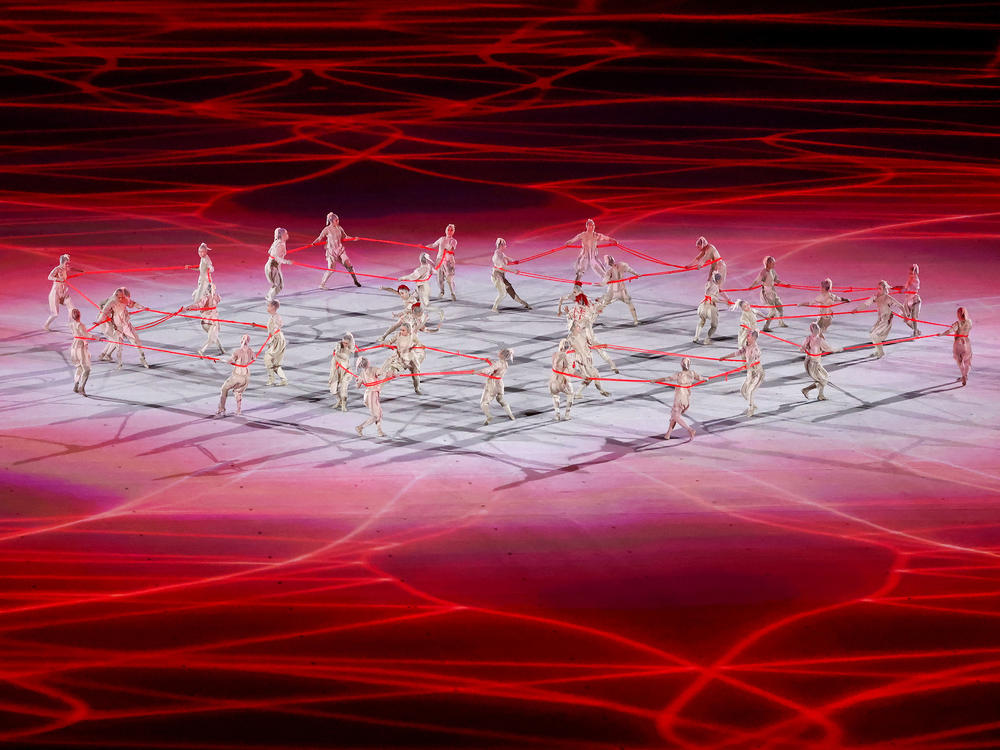Section Branding
Header Content
Somber Tone Lingers At Tokyo Games Opening Ceremony, Though Athletes Add Lift
Primary Content
Updated July 23, 2021 at 1:09 PM ET
As expected, viewers who woke up early in America to watch NBC's first live morning telecast of an Olympics opening ceremony Friday were greeted with a subdued presentation, kicked off by an explosion of fireworks erupting around a nearly empty Olympic Stadium in Tokyo.
Hosts Savannah Guthrie, on loan from NBC's Today show, and sports anchor Mike Tirico tried to bring a little enthusiasm early on, offering a giddy energy that resolved into a factoid-sprinkled patter reminiscent of the Macy's Thanksgiving parade narration. ("I have research here which says the last gold [medals] Uruguay won were in the 1920s," Guthrie said at one point, poking a little fun at the celebratory mood of the country's delegation.)
But their game efforts were undercut a bit by the presentation's somber beginning, which included video of athletes working out in their homes and a performance on the stadium floor started by an athlete in white running on a treadmill in a spotlight.
Of course, the ongoing worldwide pandemic loomed large, with rows and rows of empty stadium seats standing as silent evidence of COVID protocols that led Japanese officials to ban general spectators at the games. According to Tirico, this left about 10,000 media workers, Olympics staffers and athletes, dignitaries and assorted folks to fill a space designed to hold more than 68,000 people (including a masked First Lady Jill Biden, gamely clapping in the stands).
In particular, the ceremony offered a moment of silence for those who lost their lives in the coronavirus pandemic and the Israeli delegation killed by terrorists at the Munich Games in 1972. Tirico said recognition of the Israeli incident during the opening was a notable first for the games.
It was also an appropriate acknowledgement that this would be an Olympics like no other, where the shadow of COVID diagnoses and lack of an audience for games held in a country with a low vaccination rate will likely loom over every athletic triumph and medal win.
The "creative portion" of the Opening Ceremony, featuring dancers and performers telling the story of the host country, unfolded in spectacular precision. Dancers twirled around, connected by bands of red elastic, mimicking visual effects projected onto the stadium floor.
Moments later, dancers paid tribute to Japan's history as builders — with moments of tap dancing, even! — in a display which seemed to come off without a problem, despite the firing on Thursday of the opening ceremony's director over a Holocaust joke he made during a comedy show in 1998.
That controversy, along with a string of positive COVID tests among athletes and the ouster of a few other key officials, have contributed to a sense that the games are proceeding under a cloud of bad timing and enormous challenge. So seeing the opening ceremony proceed without a major hitch might be just the encouragement the games needs now.
By the time the parade of athletes began, with representatives from about 200 countries walking onto the stadium floor, waving their home countries' flags, NBC producers deftly focused on close-up shots of the delegations — avoiding too many images of empty seats which could dampen the mood. There was no avoiding the lack of crowd response — another factor that could affect the athletes' performance as competition unfolds.
In a moment that seemed to sum up the oddness of these new circumstances, Tirico interviewed U.S. soccer star Megan Rapinoe during the opening ceremonies while she was riding in a bus with her team after a practice.
But Rapinoe — arguably among the biggest American stars competing in Tokyo — and the rest of the U.S. soccer team wouldn't be appearing in the opening ceremonies at all. Instead, Rapinoe's fiancee, WNBA player Sue Bird, would later appear as a flag bearer for Team USA.
The ceremony did pick up, once the parade of athletes ended, as a succession of Japanese entertainers finished the show, including a jaw-dropping performance from pianist Hiromi. Dancers clad in special blue and white costumes also provided live recreations of the pictograms — graphical depictions of the 50 Olympics sports developed decades ago — in a stunning visual sequence marred only slightly when one of the performers dropped a prop midway through.
International Olympic Committee president Thomas Bach spoke of "a moment of hope," in highlighting how the world's athletes have come together in spite of COVID. "This feeling of togetherness ... this is the light at the end of the dark tunnel of the pandemic," Bach added.
Tennis champion Naomi Osaka — a citizen of Japan who will compete for that country — received the Olympic flame, capping the opening ceremony by lighting the games' cauldron in a potent symbol of unity.
But the ceremony also highlighted the challenge which awaits NBC over 17 nights of primetime coverage planned for this year's games — including a rebroadcast of the this morning's event with additional material at 7:30 tonight — as the lack or crowds and somber circumstances lend a bittersweet edge to the most majestic Olympic achievements.
Copyright 2021 NPR. To see more, visit https://www.npr.org.
Bottom Content

